Projects to check growing garbage crisis
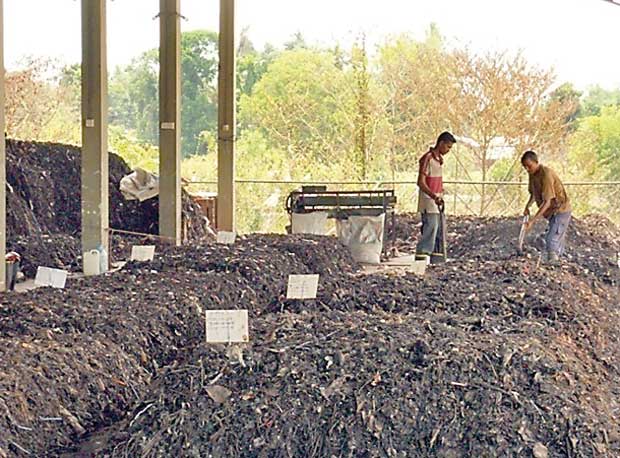
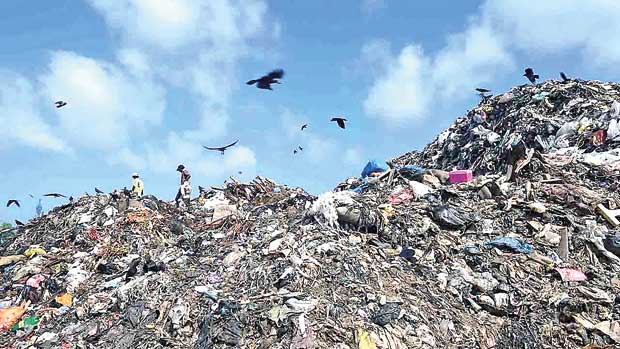
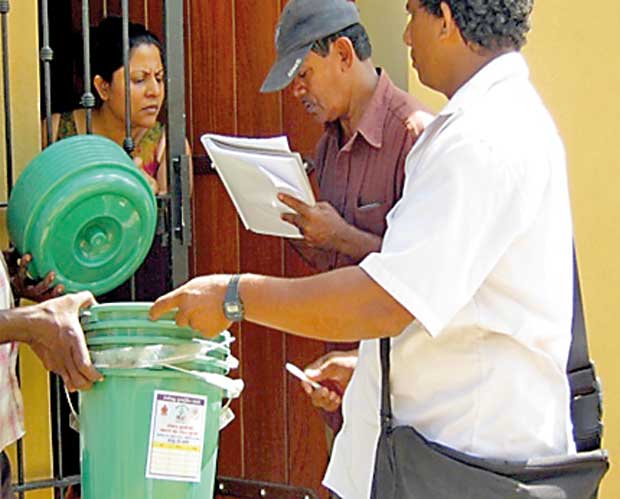
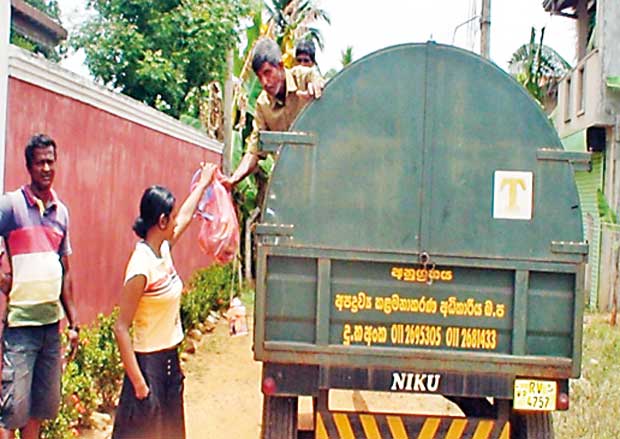


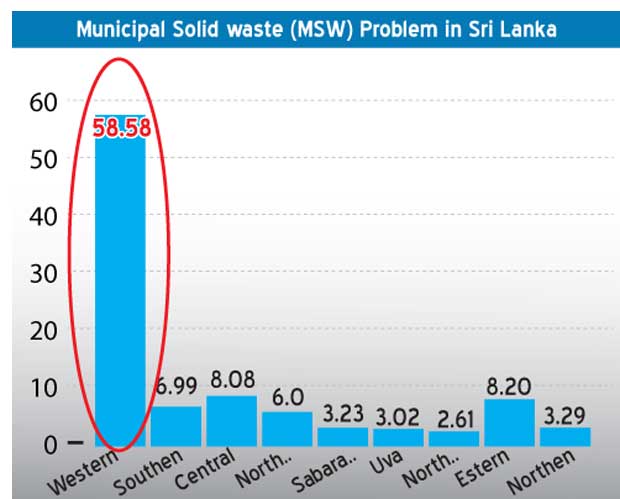
When considering the above actions, we can see that the Western Provincial Waste Management Authority (WPWMA) as a supporting agency to the Local Authority has done a sensible job in monitoring effective methodologies to find solutions to the garbage crisis.
“We have tried on several occasions to find solutions for the garbage issue. But our attempts were unsuccessful due to public protests and the high capital cost. Then we have to seek private and public aid. Therefore, we have endorsed two agreements with Fairway Waste Management (pvt) Ltd which will merge with Germany and Denmark companies and Trilogy ETC (pvt) Ltd. which will merge with OPUS Clean Energy Alliance.” The Director said.
He said that the fist company will commence the project with the garbage capacity of 500mt per day in Karadiyana which would generate 11.5 megawatt (MW) and this will release 89mn kilowatt to the grid per year. As a result of that, it will be adequate to generate electricity for 35000 families. Apart from the generation of electricity, the project is also equipped to generate 41000 tons of liquid fertilizer and 75000 tons of solid fertilizer. The total investment on this project is 73 USD. Then the second company will commence the project with the garbage capacity of 95mt per day at Gampaha, Dambuwatta which would generate 3.4 megawatt (MW). The technology which is to be used for this project is gasification i.e. burning the garbage. The total investment on this project is 30 USD.
In conclusion, the Director of WPWMA expressed his thanks on behalf of the authority to Isura Devapriya, the Chief Minister of the Western Province for the instructions given and the support rendered towards the upcoming project proposals and the issue of garbage. Nevertheless, the Director requests the general public to cooperate with local authorities in segregating and disposing their garbage at appropriate places, so that the muck collectors could collect them conveniently.





Garbage is not a problem only in Sri Lanka, but also in the rest of the countries. What is vital in this case is not how muck is collected in countries, but how the collected garbage is properly managed and recycled. It is evident how the garbage issue has affected our people and the country owing to the lack of management mechanism to utilize garbage.
I don’t want to reiterate the tragedy and the trouble caused to the people. It is pointless to claim how much garbage is collected. The governing body and its institutions should address the issue positively and take prompt actions to manage and recycle garbage.
It is in fact heartening to say that the Western Provincial Waste Management Authority (WPWMA) has been vocal on this issue and has launched two major projects to recycle garbage and generate electricity. In a discussion with Daily Mirror, the Director of the Western Provincial Waste Management Authority Nalin Mannapperuma said that there has been a drastic change during the past few decades in the physical environment in the country especially in the Western Province. He highlighted that one of the main reasons for this transformation is garbage.
been vocal on this issue and has launched two major projects to recycle garbage and generate electricity. In a discussion with Daily Mirror, the Director of the Western Provincial Waste Management Authority Nalin Mannapperuma said that there has been a drastic change during the past few decades in the physical environment in the country especially in the Western Province. He highlighted that one of the main reasons for this transformation is garbage.
“The main factors that relate to garbage generation are the population and the economic status. It has been analyzed that the economic status of the people living in the Asian and the Asia-Pacific regions will enhance in few decades; consequently there will be a boost in the resource consumption. Hence, there is a tendency for the considerable inclination in the garbage generation in a few decades. It has been estimated that in lower /lower middle income countries (which includes many Asian Countries) waste generation rates will more than double over the next 20 years. We as an Asian country have to face this situation. We can’t avoid it. The Municipal Solid Waste (MSW) in Sri Lanka has been estimated at 7000 Metric ton per day. The contribution from the Western Province to the Municipal Solid Waste (MSW) is 60% (3500 Metric tons per day). The annual growth rate of garbage generation in Sri Lanka is regarded as around 1.2-2.0%,” the Director said.
It is in fact heartening to say that the Western Provincial Waste Management Authority (WPWMA) has
 been vocal on this issue and has launched two major projects to recycle garbage and generate electricity. In a discussion with Daily Mirror, the Director of the Western Provincial Waste Management Authority Nalin Mannapperuma said that there has been a drastic change during the past few decades in the physical environment in the country especially in the Western Province. He highlighted that one of the main reasons for this transformation is garbage.
been vocal on this issue and has launched two major projects to recycle garbage and generate electricity. In a discussion with Daily Mirror, the Director of the Western Provincial Waste Management Authority Nalin Mannapperuma said that there has been a drastic change during the past few decades in the physical environment in the country especially in the Western Province. He highlighted that one of the main reasons for this transformation is garbage. “The main factors that relate to garbage generation are the population and the economic status. It has been analyzed that the economic status of the people living in the Asian and the Asia-Pacific regions will enhance in few decades; consequently there will be a boost in the resource consumption. Hence, there is a tendency for the considerable inclination in the garbage generation in a few decades. It has been estimated that in lower /lower middle income countries (which includes many Asian Countries) waste generation rates will more than double over the next 20 years. We as an Asian country have to face this situation. We can’t avoid it. The Municipal Solid Waste (MSW) in Sri Lanka has been estimated at 7000 Metric ton per day. The contribution from the Western Province to the Municipal Solid Waste (MSW) is 60% (3500 Metric tons per day). The annual growth rate of garbage generation in Sri Lanka is regarded as around 1.2-2.0%,” the Director said.

"The main factors that relate to garbage generation are the population and the economic status"

The fact is coherent that Sri Lanka is experiencing a massive garbage crisis and therefore productive actions need to be taken before the condition worsens. Moreover, it is identified that there are 25 dumpsites in the Western Province which are piled up with various types of dirt without a solution for the recycling process. At the same time, it is pleased to know the mapping of a master plan known as the Municipal Solid Waste (MSW) management which will be set to embark in 2018. Until it will be put it to practise, there are ongoing waste management practices as follows.
Reduction of garbage generation
Source segregation
Reusing
Recycling
Collection
Transportation
Small /Medium Scale Composting (140 IN SL, 25 in WP)
Small/ Medium Scale Bio gas production (no of units 150,000 unit in SL)
Small/medium scale Recycling centres
Turnkey basis
Public Privet Partnership basis

When considering the above actions, we can see that the Western Provincial Waste Management Authority (WPWMA) as a supporting agency to the Local Authority has done a sensible job in monitoring effective methodologies to find solutions to the garbage crisis.
“We have tried on several occasions to find solutions for the garbage issue. But our attempts were unsuccessful due to public protests and the high capital cost. Then we have to seek private and public aid. Therefore, we have endorsed two agreements with Fairway Waste Management (pvt) Ltd which will merge with Germany and Denmark companies and Trilogy ETC (pvt) Ltd. which will merge with OPUS Clean Energy Alliance.” The Director said.
He said that the fist company will commence the project with the garbage capacity of 500mt per day in Karadiyana which would generate 11.5 megawatt (MW) and this will release 89mn kilowatt to the grid per year. As a result of that, it will be adequate to generate electricity for 35000 families. Apart from the generation of electricity, the project is also equipped to generate 41000 tons of liquid fertilizer and 75000 tons of solid fertilizer. The total investment on this project is 73 USD. Then the second company will commence the project with the garbage capacity of 95mt per day at Gampaha, Dambuwatta which would generate 3.4 megawatt (MW). The technology which is to be used for this project is gasification i.e. burning the garbage. The total investment on this project is 30 USD.
In conclusion, the Director of WPWMA expressed his thanks on behalf of the authority to Isura Devapriya, the Chief Minister of the Western Province for the instructions given and the support rendered towards the upcoming project proposals and the issue of garbage. Nevertheless, the Director requests the general public to cooperate with local authorities in segregating and disposing their garbage at appropriate places, so that the muck collectors could collect them conveniently.


